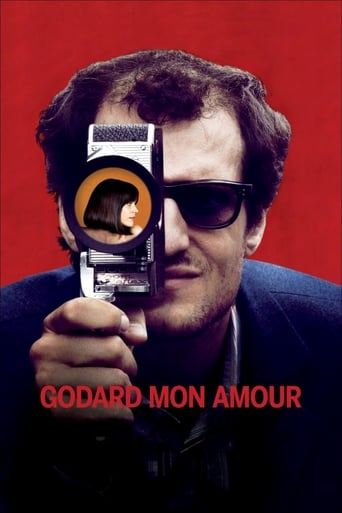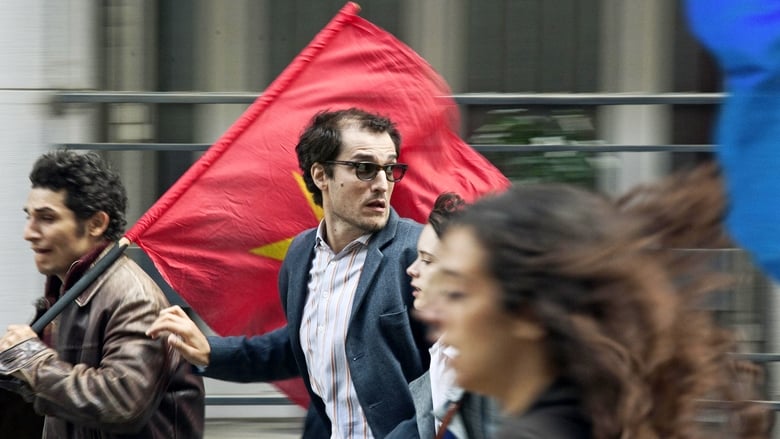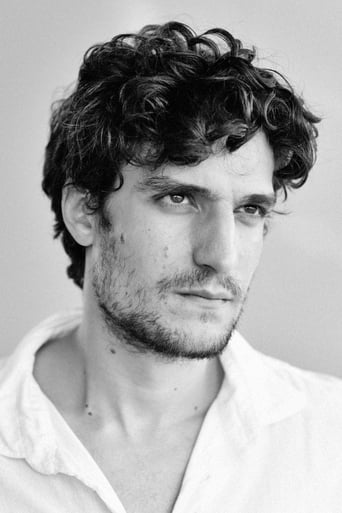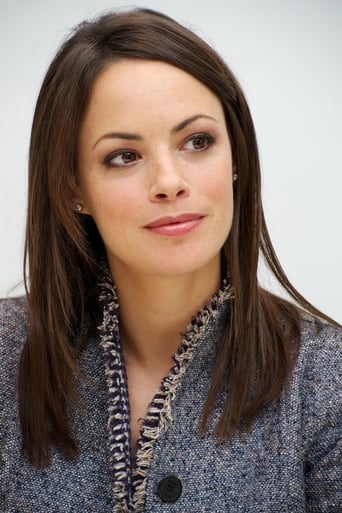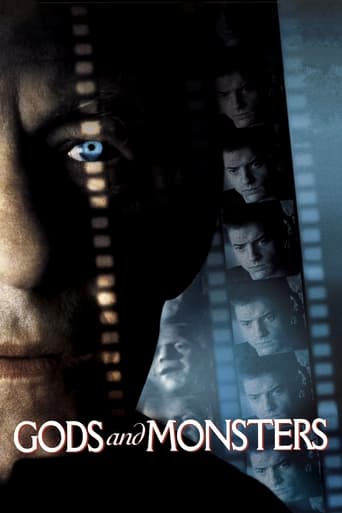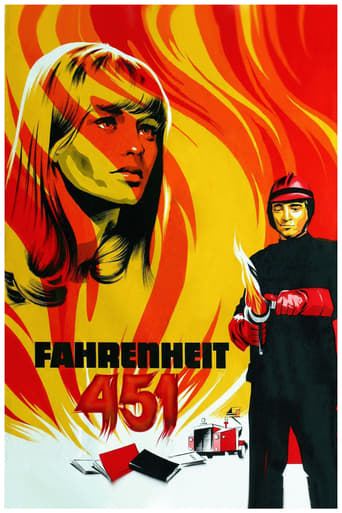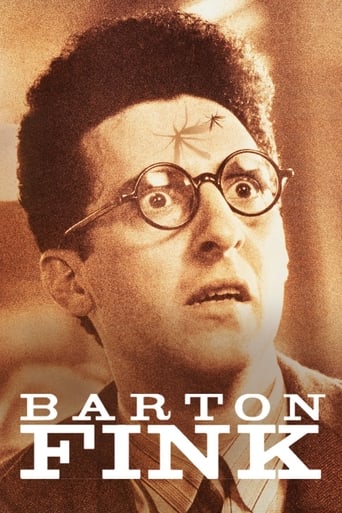Godard Mon Amour (2017)
In 1967, during the making of “La Chinoise,” film director Jean-Luc Godard falls in love with 19-year-old actress Anne Wiazemsky and marries her.
Watch Trailer
Cast


Similar titles
Reviews
Godard may have been one of the French New Wave's main stars but, as a person, he could be repulsive without trying. Not that the film portrays him as overly selfish or self-centered, but he seems to live in his own mind, and have standards that he switches at his own convenience. As the film opens, he is 37 and he has just started a romantic involvement with 19 year old exquisitely beautiful wife to be Anne (solidly played by Stacy Martin, who looks very much like Catherine Deneuve at the height of her splendor, only better) . Given that the film is mostly told from Anne's point of view, we get to see Godard's steady mental disintegration and growing loss of touch with reality, as told from her standpoint, while all along she keeps retiring into an observer's position. In light of the fact that the film is based on Anne Wiazemsky's autobiographical account of her relationship with Godard, she emerges from this film with her image apparently far more intact - but also as a bit of a tell-tale who thinks nothing of reducing her former husband's reputation to the lowest possible level.Physically, Louis Garrel looks like Godard, imitates his famous lisp very well, and his performance is superb, even if the character does nothing to encourage anyone's sympathy, let alone liking. The way he joins the student demonstrations of May 1968, but flees police as soon as he feels that he is in danger; and the way he bends Maoist doctrine to his own take on life, says much about the pitfalls of this once and briefly great director.Michel Hazanavicius' direction is first class, his screenplay not really. The submarine, Le Redoutable, and the repeatedly broken spectacles are jokes that have worn rather thin by film's end.Soundtrack is generally vivid and brings back the day, including some lovely music, but there is also some jarring noise, typical of what made Godard so unique in films like MASCULINE FEMININE, A BOUT DE SOUFFLE, LE MÉPRIS.Ultimately, it is a movie for lovers of the French cinema. I am one, and I am grateful for what I learned from it. That said, LE REDOUTABLE/GODARD MON AMOUR makes for some rather uncomfortable viewing because of Godard's disintegration. On the other hand, thank God Stacy Martin is so beautiful, with her around I can forgive any flaws in the movie.
The movie covers a period in Jean Luc Godard's life, the one he spent with his second wife, the late Anne Wiazemsky. Nobody who is at all interested in cinema should miss it. It feels and sounds quite authentic. However, based as it appears to be on Ms. Wiazemsky's memoirs (they had not spoken to each other for over 40 years), not unsurprisingly it paints JLG in a less than flattering shade. Given that the famous director is the leit motif of the film to begin with, that may give you a funny feeling. It certainly gave JLG that kind of feeling since he called the film "stupid". It isn't: gives lots of insights into the period, the Paris May movement, the film industry at the time, as well as the relationship itself, whichever side you would be inclined to take. It's a good movie.
It is such a pity that it was not enough for the director to talk about Godard, he also tried to make a film in Godard's style. In my opinion, he was not able to capture the "Godard mood" at all. Instead, the film is executed in a textbook manner, meticulously using Godard's cinematic language like a receipt and that's always a risky move (for example, Gus Van Sant's case with Psycho). Godard is Godard not for using these elements, but because he used them at the right time and in the right way. If this would have been done by breaking new grounds in cinematic language, or even without breaking the mould in such a way BUT finding the right tone, I would have liked the film much more. Godard's world has a sexy, humorous yet tragic atmosphere, where the viewer feels for the characters. To be honest, when watching a Godard movie, I'm always terribly envious that I was not born at the time of Belmondo. Here, I did not feel this longing, sadly. Having said that, the actors are cute and the director seems to be cool and all, judging from interviews, so it may be that I'm just too sentimental. :)
The French invented cinema and the Americans turned it into a big industry. If Hollywood loves making films about Hollywood, why should not make the French also films about the French cinema? Especially if we are talking about a director (Michel Hazanavicius) who already made a very successful film about Hollywood ("The Artist"). Here is his daring approach to a genre which is surprisingly new for the French cinema - movies about movies. "Redoubtable" is a daring endeavor because the subject is one year in the life of one of the most controversial film directors in the history - Jean-Luc Godard., a complex artist and personality who is also still with us, making films and even commenting on films made about him.The year is also not any other year, but 1968, one of the milestones in the history of the 20th century, a crossroad also in the history of France. The revolts of the students that peaked in May of that year had several sources of inspiration - anarchist and Maoist ideloogies among them, but also works of philosophers like Jean Paul Sartre and, yes, movies, among which Jean-Luc Godard's "La Chinoise". The French director had gained fame in the decade before with some of the best known films of the French 'Nouvelle Vague'. Some had ideological content, some other 'just' revolutionized (together with films by François Truffaut and a few other) the language of cinema. "La Chinoise" had marked the final of that period and the start of another, a much more politically oriented stage in his creation. It also marked the beginning of the relationship soon to turn into marriage with Anne Wiazemsky. (the second for Godard, after he had married and divorced Anna Karina). The implication of Godard in politics and the rocky marriage with Anne are the principal topics of "Redoubtable". The Godard in the film does not come very clean from this historical re-evaluation on screen which is based on the novel-memoirs of his ex-wife. He appears as a 'gauchist' intellectual who sides with the revolt and hates police, but his behavior and way of life belong to the class he despises. His ideology seems more anarchist and quite remote from realities. He fails to understand the totalitarian ways of his idols Mao and Che and is stupefied when "La Chinoise" is rejected by the Chinese embassy as 'reactionary art' and he is refused a promotion trip to China. His joining of the May 1968 revolts leads to confusing speeches in the meeting halls at Sorbonne, including an outrageous rant paralleling Jews and Nazis. He is, as many other before him, a victim of a revolution in march that devours its idols. Eventually he makes the right choice understanding that an artist can better serve the revolution by means of art, and for a while he looks better holding a camera on the streets of Paris in 1968, or founding the Djiga Vertov collective of politically active filmmakers. This may lead to another impasse, an artistic one, but that will not be part of the story in this film.I liked the film. Michel Hazanavicius uses a technique that he already successfully applied in "The Artist" - talking about a past period in the history of the cinema with the cinematographic tools specific to that era. He even added more nuances, as different episodes are filmed in different styles adapted to the content. We see the scenes with Paris on barricades filmed with 'Nouvelle Vague' hand-held camera. A trip by car in which a crowded mix of film-makers and actors get a speech from their driver about the simple taste in cinema of the masses, so remote from their experiences, is filmed in a static car, like in an American movie of the 30s or 40s. At the peak of the domestic crisis the unbearable soundtrack covers the voices of the disputing lovers. Louis Garrel created a Godard who oscillates between his (well deserved) ego and surprising moments of lack of confidence, who thinks in an ideological and doctrinaire manner but knows little about the people the ideology is supposed to serve, who models his life and art to politics and has little understanding or patience for his own adulating audiences. The relationship with Anne (Stacy Martin) is almost permanently one-directional, a crisis in building from the very first moments. Both actors do fine jobs, and they are placed in an environment that brings brilliantly to life the period for those spectators who lived it as well as for those who did not.Focusing on politics and the stormy marriage between Jean-Luc and Anne, "Redoubtable" tells less about the cinema that he made - and 1968 was actually a very prolific year, as were the coming 3 or 4 years, although much of what he did was documentary of collective work within the Djiga Vertov group. The one scene that show him at work is filmed one year later, and hints to the fact that, at least for the coming period that was to last about another decade, Godard made a choice. Between art and revolution, he explicitly chose revolution. The final judgment about this period may have not been pronounced, and this film could be part of a re-opening of the discussions and more important - seeing again his films. Godard is Godard, and he never seems to accept to rest.

